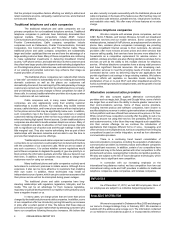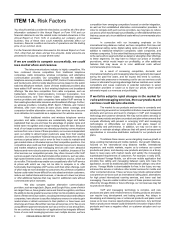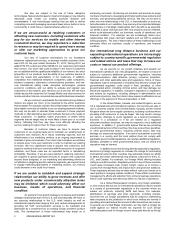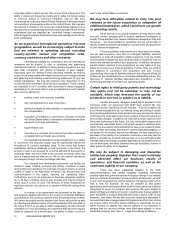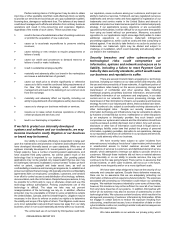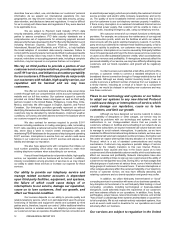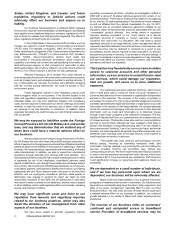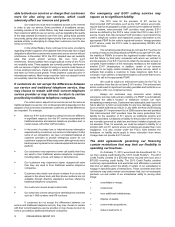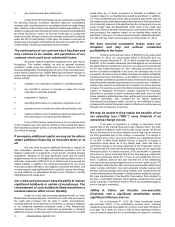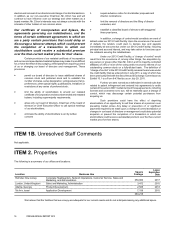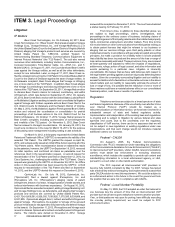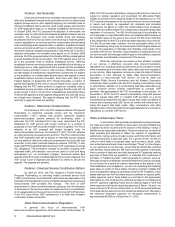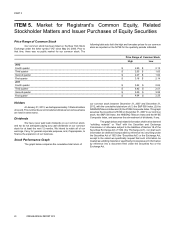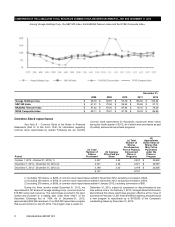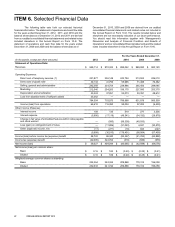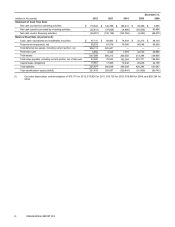Vonage 2012 Annual Report Download - page 19
Download and view the complete annual report
Please find page 19 of the 2012 Vonage annual report below. You can navigate through the pages in the report by either clicking on the pages listed below, or by using the keyword search tool below to find specific information within the annual report.13 VONAGE ANNUAL REPORT 2012
States, United Kingdom, and Canada, and future
legislative, regulatory or judicial actions could
adversely affect our business and expose us to
liability.
Our business has developed in a relatively lightly regulated
environment. However, the United States, United Kingdom, and Canada
have applied some traditional telephone company regulations to VoIP
and continue to evaluate how VoIP should be regulated. The effects of
future regulatory developments are uncertain.
In the United States, interconnected VoIP providers, such as
Vonage, are subject to certain Federal Communications Commission
("FCC") rules. For example, on August 5, 2005, the FCC released an
Order extending the obligations of the Communications Assistance for
Law Enforcement Act (“CALEA”) to interconnected VoIP providers.
Under CALEA, telecommunications carriers must assist law
enforcement in executing electronic surveillance, which include the
capability of providing call content and call-identifying information to a
local enforcement agency, or LEA, pursuant to a court order or other
lawful authorization. We could be subject to an enforcement action by
the FCC if our CALEA solution is deemed not fully operational.
Effective February 2, 2011, another FCC order reduced to
one business day the amount of time that a telecommunications provider
such as Vonage has to port a telephone number to another provider. If
we, or third parties we rely upon for porting, have difficulty complying
with the one-day porting requirement, we could be subject to FCC
enforcement action.
Future legislative, judicial or other regulatory actions could
have a negative effect on our business. If we become subject to the
rules and regulations applicable to telecommunications providers in
individual states, we may incur significant litigation and compliance
costs, and we may have to restructure our service offerings, exit certain
markets, or raise the price of our services, any of which could cause
our services to be less attractive to customers. In addition, future
regulatory developments could increase our cost of doing business and
limit our growth.
We may be exposed to liabilities under the Foreign
Corrupt Practices Act, the UK Bribery Act, and similar
laws, and any determination that we violated any of
these laws could have a material adverse effect on
our business.
We are subject to the Foreign Corrupt Practice Act ("FCPA"),
the UK Bribery Act and other laws that prohibit improper payments or
offers of payments to foreign governments and their officials and political
parties by persons and entities for the purpose of obtaining or retaining
business. We have operations, agreements with third parties, and make
sales internationally. In addition, we plan to expand our international
operations through potential joint ventures with local partners. Our
international activities create the risk of unauthorized payments or offers
of payments by one of our employees, consultants, partners, sales
agents or distributors, even though these parties are not always subject
to our control. It is our policy to prohibit these practices by our employees,
consultants, partners, sales agents or distributors However, our existing
safeguards and any future improvements may prove to be less than
effective, and our employees, consultants, partners, sales agents or
distributors may engage in conduct for which we might be held
responsible. Violations of the FCPA, the UK Bribery Act or other laws
may result in severe criminal or civil sanctions, and we may be subject
to other liabilities, which could negatively affect our business, operating
results, and financial condition.
We may incur significant costs and harm to our
reputation from lawsuits and regulatory inquiries
related to our business practices, which may also
divert the attention of our management from other
aspects of our business.
We have been subject to periodic regulatory inquiries
regarding our business practices, including an investigation settled in
2009 with a group of 32 states' attorneys general into certain of our
business practices. There was no finding of any violation or wrongdoing
by us, and the 32 states participating in the settlement have released
us and our affiliates from the matters investigated. On July 18, 2011,
we entered into an amended settlement agreement initiated at our
request to reflect revised business practices associated with our new
“consumable” product offerings. Any similar claims or regulatory
inquiries, whether successful or not, could require us to devote
significant amounts of monetary or human resources to defend
ourselves and could harm our reputation. We may need to spend
significant amounts on our legal defense, senior management may be
required to divert their attention from other portions of our business, new
product launches may be deferred or canceled as a result of any
proceedings, and we may be required to make changes to our present
and planned products or services. If, as a result of any proceedings, a
judgment is rendered or a decree is entered against us, it may materially
and adversely affect our business, financial condition, and results of
operations and harm our reputation.
Third parties may fraudulently use our name to obtain
access to customer accounts and other personal
information, use our services to commit fraud or steal
our services, which could damage our reputation,
limit our growth, and cause us to incur additional
expenses.
Our customers have been subject to “phishing,” which occurs
when a third party calls or sends an email or pop-up message to a
customer that claims to be from a business or organization that provides
services to the customer. The purpose of the inquiry is typically to
encourage the customer to visit a bogus website designed to look like
a website operated by the legitimate business or organization or provide
information to the operator. At the bogus website, the operator attempts
to trick the customer into divulging customer account or other personal
information such as credit card information or to introduce viruses
through “trojan horse” programs to the customers’ computers. This has
resulted in identity theft from our customers and the unauthorized use
of Vonage services. Third parties have also used our communications
services to commit fraud. Although we have engaged a third party to
assist in the shutdown of purported phishing sites, if we are unable to
detect and prevent “phishing,” use of our services for fraud, and similar
activities, our brand reputation and growth may suffer and we may incur
additional costs, including costs to increase security, or be required to
credit significant amounts to customers.
Third parties also have used our communications services
without paying, including by submitting fraudulent credit card
information. This has resulted in our incurring the cost of providing the
services, including incurring call termination fees, without any
corresponding revenues. We have implemented anti-fraud procedures
in order to limit the expenses resulting from theft of service, which were
not material in 2012. If our procedures are not effective, theft of service
could significantly increase our expenses and negatively impact our
profitability.
We are dependent on a small number of individuals,
and if we lose key personnel upon whom we are
dependent, our business will be adversely affected.
Many of the key responsibilities of our business have been
assigned to a relatively small number of individuals. Our future success
depends to a considerable degree on the vision, skills, experience, and
effort of our senior management, especially Marc P. Lefar, our Chief
Executive Officer. The loss of the services of these officers could have
a material adverse effect on our business. In addition, our continued
growth depends on our ability to attract and retain experienced key
employees.
The success of our business relies on customers’
continued and unimpeded access to broadband
service. Providers of broadband services may be





